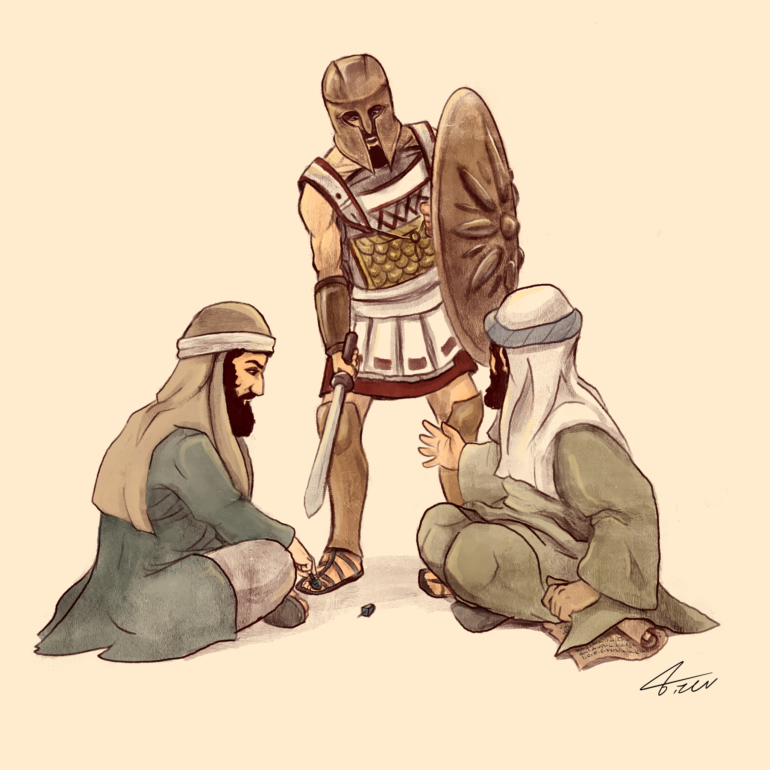The eleventh chapter of a podcast series on the first Book of Maccabees.
For more content from VISION Magazine, subscribe to our newsletter and follow us on Twitter @VISION_Mag_, Facebook and YouTube. If you haven’t already, don’t forget to subscribe to our podcast on SoundCloud, iTunes, Stitcher, TuneIn, or Spotify and leave a rating and review to help us get our message out to a wider audience!
To support the podcast, head over to our PayPal portal and be sure to write a note that your contribution is for the podcast.
Hosted by: Robert Goodman
Transcript:
Shalom Aleikhem! And welcome back to Sefer Maccabim!
Last time we learned about Alexander Balas and his victory over Demetrius. And how Demetrius’s son (also called Demetrius) came from Crete to retake the kingdom, and how Yehonatan won a battle against his general Apollonius. Now we’re going to see what happens when Egypt, who were still a world power at this time, switches sides in the battle between Alexander and Demetrius.
You’ll remember from the previous chapter that Ptolemy entered into a marriage alliance with Alexander. Chapter 11 begins with Ptolemy king of Egypt deciding he doesn’t want to play nice anymore and would much rather claim the Syrian-Greek Empire to add to his own Egyptian kingdom. He decides to go about this in a sneaky way.
He gathers a great army and leads them, part by ship, part by land, along the coast towards Antioch and Seleucid territory. He acts like he’s just marching his army through peacefully, and all the Seleucid cities he passes through receive him happily, because after all, Ptolemy is still Alexander’s father-in-law. And Alexander, who is still emperor, has no idea Ptolemy has defected and has commanded that his father-in-law be greeted warmly wherever he goes. This is exactly what Ptolemy was hoping for, and as he journeys up the coast he leaves a garrison of soldiers in every city he passes through. This way Ptolemy is able to claim a large number of Seleucid cities without even a battle.
As expected, Ptolemy’s journey brings him near Judea, and as he approaches the country, some of the Hellenists approach him and insist on showing Ptolemy the wreckage of the Dagon temple at Ashdod, and all the bodies of dead soldiers piled up. They loudly blame Yehonatan for causing all this damage, hoping to incite Ptolemy against him, but the king says nothing. He has no interest in declaring war on Judea – possibly he thinks he could never win, possibly his only desire is to unseat Alexander – but he wants Egypt to remain at peace with Judea. Sure enough, Yehonatan comes from Jerusalem to greet him. they salute each other in mutual respect and Ptolemy gifts Yehonatan a variety of expensive presents. Yehonatan accompanies the king as far north as the Litron river, and then returns to Jerusalem.
So Ptolemy arrives in Akko, having claimed many coastal cities for himself, but here he is in for a big shock, as he is almost assassinated by a friend of Alexander named Ammonius, who is later killed for this. Ptolemy writes to Alexander, still pretending to be his ally, saying that, “I demand you punish Ammonius, because he nearly took my life!”
When Alexander does not respond, Ptolemy realizes that Alexander himself had ordered this attempt on his life, and he starts to hate his son-in-law, and he is sorry he ever made Alexander his ally or gave him his daughter in marriage.
So Ptolemy continues his journey north and arrives in Antioch, whereupon he writes to Demetrius II: “Let us make an alliance together, and I’ll take my daughter away from Alexander and give her to you as a wife instead.”
Demetrius is very pleased, and Ptolemy’s daughter Cleopatra becomes his wife instead.
Now the people of Antioch hate Alexander as they had suffered greatly under his rule. But they still bear considerable animosity towards Demetrius on account of his father being a lousy ruler towards them, as we mentioned in chapter 10. So when Ptolemy arrives in Antioch, the people not only welcome him with open arms, but crown him as their king right there.
Now Ptolemy here realizes he’s in a bit of a quandary. On the one hand, he would really like to take the Seleucid throne and rule over both Egypt and the Syrian-Greek Empire. After all, that’s why he came against Alexander in the first place.
On the other hand, he realizes that Rome, who by this time are becoming the dominant world superpower, would consider a united Egyptian-Seleucid Empire ruled by Ptolemy too much of a threat to Rome’s military superiority, and would quickly step in to demand its dissolution. So wanting to avoid the wrath of the Romans, Ptolemy meets with the people at Antioch and asks them to accept Demetrius as their ruler. He assures them that he would personally make sure Demetrius would treat them well, and that it’s enough for him to rule over Egypt. This suffices to convince the people of Antioch to accept Demetrius son of Demetrius as their next emperor.
Now all this time, Alexander was away in Cilicia, a region in what today is southern Turkey, because the inhabitants of Antioch had revolted against him and driven him out of the capital.
When Alexander hears Ptolemy has entered Antioch and persuaded the people to accept Demetrius as their ruler, he is inflamed. He still has very many followers, not to mention a supply of those infamous Greek war elephants, and he gathers a huge army and leads them south from Cilicia to Antioch, where he burns some of the surrounding countryside and pillages it.
But Ptolemy gathers his own army and beats Alexander in battle, forcing the latter to flee into Arabia. However, Ptolemy does not escape unscathed. Josephus tells us how during the battle, Ptolemy’s horse heard the sound of a war elephant and grew scared, casting Ptolemy off its back. When the enemy soldiers see Ptolemy cast to the ground like that, they fall upon him and inflict so many head wounds on him that by the time his guards catch up with him, the Egyptian king is almost dead. For four days he lies in bed unable to speak or understand his surroundings, dead to the world.
On the fifth day he recovers enough to regain his senses and is met with a pleasing sight. After Alexander fled into Arabia following his defeat, an Arab named Zabdiel beheaded him, and sent the head as a gift to Ptolemy. So Ptolemy has some satisfaction in seeing his friend-turned-enemy dead before his eyes, but shortly after his head wounds prove too much and three days later, he too departs this world. So just like that, two major players are gone from the field, leaving Demetrius as the sole Seleucid ruler.
Now this chapter hasn’t actually gotten round to the Jews yet, but it does so now. Around this time as Demetrius emerges as Seleucid Emperor, Yehonatan is gathering an army of Jews to finally take down the Acra, which is still acting as the major Seleucid/Hellenist stronghold in the heart of Jerusalem. He also has made many large engines of war, and the Jews besiege the Acra and are determined to demolish it once and for all. Some of the Hellenists elsewhere in Judea travel to Antioch and inform Demetrius that Yehonatan was besieging the Acra. Understandably, Demetrius is very angry when he hears this, because the Acra most likely still housed a great number of Seleucid mercenaries.
So Demetrius journeys south to Akko and sends a message to Yehonatan demanding two things: one that he should call off his siege of the Acra, and two to hurry and meet him in Akko without delay. Yehonatan maintains the siege but does agree to come and meet Demetrius. He selects several of the elders and the kohanim, gathers silver, gold and presents to give to the king as a gift, and they hurry to meet him in Akko.
Despite the bad words the Hellenists had spoken to the king about Yehonatan, when he and his entourage arrive at Akko with a handsome gift for Demetrius, the Seleucid king is overjoyed, and chooses Yehonatan to be one of his close friends, also granting him the authority to serve as Kohen Gadol. Yehonatan requests that Demetrius free Judea from the heavy taxes currently levied upon them by the Seleucids, and he promises Demetrius three hundred talents of silver in exchange. Demetrius consents and sends Yehonatan a copy of a letter confirming Judea’s release from paying tribute, which he instructs Yehonatan to display in a prominent place on the walls of Yerushalayim.
Now let me include a point I learned from Rav Yehuda HaKohen: Note that by this stage of the revolt, the Maccabean faction does not function the same way as it did at the start of the revolt.
The Jews are still fighting for the same goal – namely, political independence from Seleucid Greece – but in the early days under Yehuda when they lived in the mountains, the Maccabees were very much guerrilla fighters. Now they function more as a political party with a military wing. They still maintain the capacity to wage war against their enemies, but it’s no longer the only course of action.
The Maccabees possess considerable power and are recognized as a force to contend with, meaning the option is open for Yehonatan to use diplomatic means to achieve his goal of political independence for Judea (independence has not yet been achieved for Judea because they are still subject to certain Seleucid taxes, and bands of foreign soldiers are still installed up and down the country).
This is a common pattern in revolutionary wars: At first the revolutionaries are small in number and power and are limited to making surprise attacks on the enemy. But as the revolution progresses and they gain power and prestige other means open to them of pursuing their goal. In this chapter, we see Yehonatan using both means; he communicates with Demetrius by letter, and he also takes his army and goes to war against Demetrius, as we shall see.
After sending Yehonatan the letter, Demetrius realizes he doesn’t actually have anyone left to fight. The empire is peaceful. So he makes the decision to dismiss most of his soldiers without pay, and even the few he holds onto receive a reduced salary. But this decision to save money proves to be a bad one, because the soldiers, who relied on the army for their income, are now out of a job, and become very resentful towards Demetrius.
Indeed, Josephus informs us how other professional armies at the time used to pay their soldiers full wages even in peacetime, in order that if an occasion arose to fight again, the soldiers would be happy and willing to immediately step up and do so. In fact, this decision is going to prove very costly indeed for Demetrius. It’s not just the army, the people of Antioch hate him too, because he, just like his father, Demetrius I, is apparently treating the populace very badly. So the people of Antioch are itching for the chance to unseat Demetrius.
That chance comes when Yehonatan sends ambassadors to Demetrius bearing gifts and the following message: “Please remove your mercenaries from the Acra and from the various garrisons across Judea (because Judea can’t be fully independent while the enemy is still keeping soldiers there against the people’s will).”
Demetrius replies: “Not only will I do this for you, but much more, once I have finished fighting the war I’m currently engaged in against some of my subjects. Just one thing: my army’s deserted me and I really need some more soldiers, do you think you could send me reinforcements?”
Yehonatan accedes to Demetrius’s request by sending him 3,000 toughened Judean soldiers.
True to form, Yehonatan is again using diplomacy. He’s not on Demetrius’s side, he certainly has no obligation to send him soldiers. He’s only interested in pursuing the goal of Judean independence from Seleucid rule.
However, he judges at this stage that assisting Demetrius is the best course of action towards that goal, considering Demetrius promised to remove his mercenaries from Judea and even more if Yehonatan sends him soldiers.
In any case, Demetrius knows his army has turned on him and is very grateful to Yehonatan for sending him the 3000 soldiers, but the population of Antioch are not. Because when they see the reinforcements arriving, they think, “the emperor’s building up his army again, unless we stop him he’ll come down hard on us all!”
So the people of Antioch – 120,000 of them – grab their weapons and storm towards the palace with the goal of assassinating Demetrius. They storm towards the palace and block all the exits. Demetrius orders the Jewish soldiers and all the mercenaries still on his side to fight the oncoming crowd, but they are no match for the tens of thousands from Antioch.
At this point, the Jews decide to take matters into their own hands.
You may remember how back in chapter 3 we mentioned how the bow and arrow was a signature Judean weapon? Well the Jewish soldiers realize they can make use of that. They climb up to the top of the palace with their bows and rain down arrows upon the vast mob of Antiochians outside. Being out of reach from them, they suffer no casualties, but they inflict many upon the mob outside.
Eventually they drive the mob back from the houses directly outside the palace, at which point some of the Jews race down and set those houses on fire. Now Josephus tells us that the houses in Antioch back then were made of wood and positioned very closely together, so of course the fire spreads like nobody’s business, and goes on to burn down the whole city.
When the people of Antioch see they cannot reach the king nor stop the fire, they realize they have to flee. So they do just that, and the Jews jump from rooftop to rooftop chasing the fleeing crowds and shooting more arrows at them. When Demetrius realizes the crowd are now busier with saving their wives and children than with killing him, he sees the tide of the battle has turned and he and his mercenaries slay a great many Antiochians in the narrow alleyways throughout the city, until the people throw down their weapons and plead “Grant us peace, and let the Jews not assault us any longer!”
So the battle ends with Demetrius’s life spared. Of the 120,000 Antiochians who stormed the palace, the Jews and Demetrius’s other forces slew around 100,000 – a clear victory for Demetrius. But remember how Demetrius promised Yehonatan that after the battle he would withdraw all the mercenaries from Judea? Well that doesn’t happen – in fact Demetrius goes back on his word and acts like a real jerk towards Yehonatan, threatening to go to war against him unless he pays him the tribute owed him by Judea – the very same tribute which he so generously freed him from in that ridiculous letter back in chapter 10. And he would have followed through on this too, if not for a new development which does rather change the course of events.
Although Alexander Balas has by now been slain by an Arab, he does have a surviving son, named Antiochus, who is being brought up by another Arab man named Amalkiel. One member of Alexander’s old forces, named Tryphon, who seemingly is still loyal to Alexander, sees how all the dismissed soldiers are grumbling against Demetrius and realizes this could be a perfect opportunity to overthrow the emperor.
So Tryphon goes to Amalkiel and requests that he give Antiochus over to him that he might make him the emperor instead of Demetrius, telling him how Demetrius’s soldiers are no longer loyal to him and that this is the chance they’ve been waiting for to overthrow him.
At first Amalkiel is disbelieving, but after much persuasion on Tryphon’s part, he accedes and hands over the young Antiochus to Tryphon, who escorts him back to Antioch and crowns him as king there. And now Demetrius really pays for not paying his soldiers, because when they hear that the son of their hated master’s enemy has been crowned as king, they all flock to pledge allegiance to him, and with these new forces Tryphon declares war against Demetrius and wins, taking control of the city and also of Demetrius’s herd of war elephants.
Demetrius retreats northward to Cilicia in modern day southern Turkey, the same place where Alexander was.
Now the young Antiochus immediately sends ambassadors to Yehonatan to declare his desire for friendship between the two of them. And not only does he officially recognize him as the Kohen Gadol, but sends him numerous gifts including a golden button, the official insignia worn by friends of the emperor. Yehonatan is overjoyed and sends ambassadors back to Antiochus and Tryphon, saying, “I’ll be more than happy to join with you to fight against Demetrius. He’s an ungrateful so-and-so; when his people revolted against him I sent him three thousand soldiers and if not for them his people would have killed him, but the minute the threat passed he’s acting like I’m his worst enemy.”
So Antiochus grants Yehonatan the right to raise an army from his own Syrian-Greek troops, and go to fight Demetrius. The soldiers, as we mentioned, have hated Demetrius ever since he dismissed them from the army without pay, and they are delighted to join up with Yehonatan. So – incredibly – we have the leader of the Jewish forces heading a Seleucid army.
Before he actually goes to fight Demetrius, Yehonatan circulates among the cities of the coastal plain, asking them to join with him and provide soldiers to join the fight against Demetrius, which most of them do so happily. The inhabitants of Ashkelon even bring him presents.
The only trouble Yehonatan has is when he arrives at Gaza, for even though the populace is not loyal to Demetrius, they are not ready to back Antiochus either, and they shut Yehonatan out of the city. Annoyed, Yehonatan commands his troops to besiege the city, and burns and spoils the open land around it. When the inhabitants of Gaza see they are only bringing suffering upon themselves, they capitulate and welcome Yehonatan into the city. Yehonatan graciously makes peace with them, although he does take the sons of the city chiefs as hostages to be kept in Jerusalem.
As it turns out, Yehonatan has built up his army just in time, because shortly after he hears news that Demetrius is marching against him with an army, and is currently in the Galilee.
So Yehonatan leaves Shimon in Judea to watch over things while he marches north to deal with Demetrius. Shimon raises as large an army of Jews from the surrounding areas of Judea as he can, and besieges Beit Tzur, the strongest fortification in Judea which still has a garrison of mercenaries stationed there, and of which Shimon is determined to regain control. He brings huge war engines to the outskirts of the city and keeps up the siege for many days, until the mercenaries inside are afraid that if Shimon breaks his way in by force, he’ll surely slaughter the lot of them. So they send a message to Shimon saying if he promises to let them go unharmed, they’ll leave the city without a fight. Shimon acquiesces, and the mercenaries leave Beit Tzur and head north to join Demetrius’s army, and Shimon fills the city with soldiers of his own.
Meanwhile, Yehonatan has lead his army north and camped by the shore of the Kinneret, after which they marched to the nearby plain of Ḥatzor. Now anyone familiar with the topography of northern Israel knows that the land north-west of the Kinneret is very low and flat, but nearby there are very tall mountains at the eastern edge of the Galilee. And unknown to Yehonatan, Demetrius got wind of the fact that he was coming and hid part of his forces in the mountains. When Yehonatan arrives at the plain of Ḥatzor, he finds Demetrius’s army there and comes to meet him, but before he can get them ready for battle the other part of Demetrius’s army appears from the other direction, descending from the mountains to trap them in a perfect ambush. Fearing they will be caught between the ensuing armies from the mountain and the plain, Yehonatan’s forces, quite simply, flee. Only about fifty of his soldiers, as well as two army captains who incidentally are named Matityahu and Yehuda, stay with him.
When Yehonatan sees his forces deserting him, he tears his clothes and places earth on his head as a sign of mourning, and prays to HaShem that he should grant them victory. Then he gathers his fifty soldiers and they charge straight at Demetrius’s forces.
The enemy soldiers, who were confident of success in the wake of their ambush and the Jews’ flight, stop short. They are confused by Yehonatan’s unexpected onslaught, and very afraid, and they begin to run away.
When the fleeing Jews look over their shoulders and see the enemy fleeing from before Yehonatan, they are encouraged, and turn around to rejoin the fight. Around 3,000 of Demetrius’s forces are killed, and the rest are forced to flee back to their base camp in Kedesh, a town north of the Kinneret. So we see that Yehonatan’s courage and unwavering faith in HaShem brought the Jews yet another miraculous victory.
That brings us to the end of chapter 11, and we’ve seen a lot happen here: Ptolemy decides he no longer wants to work with Alexander and would rather rule himself, a battle between the two of them ultimately takes them both out leaving Demetrius as ruler, he dismisses most of his army, his people storm his palace in Antioch but are driven away by the Jews shooting from the rooftops, Tryphon crowns Antiochus son of Alexander as emperor who reaches out to Yehonatan, and with Antiochus’s blessing Yehonatan journeys north to fight Demetrius’s forces in the eastern Galilee, where the Jews are delivered a miraculous victory.
I think the underlying theme is that Yehonatan is continuing to use whatever means he sees necessary to advance the goal of Judean independence. Next time, in chapter 12 we’ll get another look at our good old friends the Romans. Until then, peace out.





